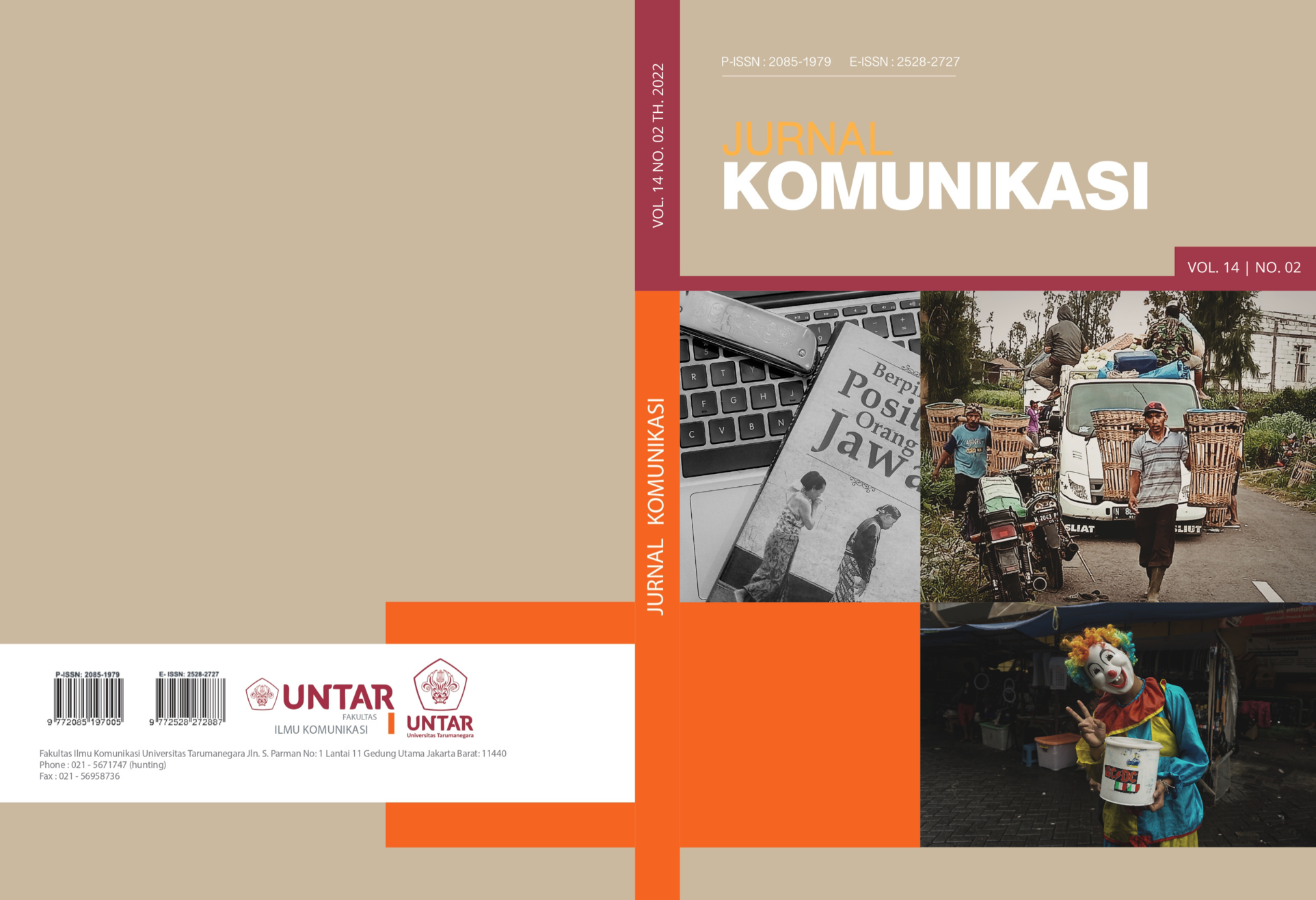The Pattern of Disseminating Information on The Garut Regency DISPARBUD in The Development of Ecovillage
Main Article Content
Abstract
Indonesia is known to the world for the tourism it offers. Various approaches to tourism are now emerging over time, and one of the focuses of government development is village-based tourism or ecovillage toursim. The development of this tourist village itself cannot run well if there is no cooperation between the local government and the local community. Therefore, there is a need for communication between the two parties who have a similar vision and mission and are able to work together to develop an ecovillage. This is also what the West Java government and the people of Garut city are doing to develop tourist villages in their area. This study aims to determine the pattern of information dissemination carried out by the Garut Regency Tourism and Culture Office (DISPARBUD) in the development of an ecovillage-based tourism. Using a qualitative descriptive case study method and involving three members of DISPARBUD as the participants, the results of this study indicate that DIPSPARBUD has a simple pattern of disseminating information to local communities regarding the development of ecovillage. This pattern goes through three stages namely; (1) Information distribution (determining communicators, compiling messages, scheduling socialization), (2) Performance reporting (analyzing and responding to the effects of communication, (3) Managing stakeholders (evaluation). With this communication pattern, DISPARBUD seeks to optimize the delivery of information regarding development a tourist village that continues to move forward and is expected to produce many other tourist villages in the future
Article Details
Section

This work is licensed under a Creative Commons Attribution-ShareAlike 4.0 International License.
This work is licensed under a Jurnal Komunikasi Creative Commons Attribution-ShareAlike 4.0 International License.How to Cite
References
Ahkam, B. S., Sumpena, D., & Aziz, A. (2018). Peran Pemerintah Desa dalam Meningkatkan Kesejahteraan Masyarakat melalui Program Desa Wisata. Tamkin: Jurnal Pengembangan Masyarakat Islam, 3(2), 43–64.
Akhmad, K. A. (2015). Pemanfaatan Media Sosial bagi Pengembangan Pemasaran UMKM (Studi Deskriptif Kualitatif pada Distro di Kota Surakarta). DutaCom Journal, 9(1), 43–54. http://journal.stmikdb.ac.id/index.php/dutacom/article/view/17
Anggreswari, N. P. Y., Harikaputri, P. A., Rifqi, M., & Surya Sidantha, I. N. W. (2021). The Strategi Komunikasi Pembangunan dalam Mempertahankan Eksistensi Pasar Seni Guwang di Masa Pandemi. Ideas: Jurnal Pendidikan, Sosial, Dan Budaya, 7(3), 223. https://doi.org/10.32884/ideas.v7i3.416
Arismayanti, N. K. (2015). Pariwisata Hijau Sebagai Alternatif Pengembangan Desa Wisata Di Indonesia. Jurnal Analisis Pariwisata, 4, 1–15.
Dewi, M. H. U. (2013). Pengembangan Desa Wisata Berbasis Partisipasi Masyarakat Lokal Di Desa Wisata Jatiluwih Tabanan, Bali. Jurnal Kawistara, 3(2), 129–139. https://doi.org/10.22146/kawistara.3976
Farrell, T. S., & Kennedy, B. (2019). Reflective practice framework for TESOL teachers: One teacher’s reflective journey. Reflective Practice, 20 (1), 1-12. doi: 10.1080/14623943.2018.1539657
Gartika, D., & Diana, M. (2020). Jejaring Kebijakan Dalam Pelaksanaan Program Ecovillage di Desa Mekarmukti, Kabupaten Bandung Barat: Policy Network in The Implementation of Ecovillage Programs in Mekarmukti Village, Bandung Barat District. Creative Research Journal, 06(1), 15–28.
Hamali, A. Y. (2016). Pemahaman Strategi Bisnis & Kewirausahaan. Kencana Pranamedia Group.
Hermawan, H. (2016). Dampak Pengembangan Desa Wisata Nglanggeran Terhadap Ekonomi Masyarakat Lokal. Jurnal Pariwisata, 3(2), 105–117.
Ismayanti, I. (2010). Pengantar pariwisata. PT Gramedia Widisarana.
Istiyanti, D. (2020). Pemberdayaan Masyarakat Melalui Pengembangan Desa Wisata di Desa Sukawening (Community Empowerment Through Development of Tourist Villages in Sukawening Village). Jurnal Pusat Inovasi Masyarakat, 2(1), 53–62.
Kirana, C. A. D., & Artisa, R. A. (2020). Pengembangan Desa Wisata Berbasis Collaborative Governance di Kota Batu. Kolaborasi : Jurnal Administrasi Publik, 6(1), 68–84. https://doi.org/10.26618/kjap.v6i1.3119
Miles, M. B., & Huberman, M. (2002). The qualitative researcher's companion. Sage.
Newcomer, K. E., Hatry, H. P., & Wholey, J. S. (2015). Conducting semi-structured interviews. Handbook of practical program evaluation, 492.
Pantiyasa, I. W. (2018). Persepsi Dan Partisipasi Masyarakat Dalam Pengembangan Smart Eco-Village Destination Di Desa Wisata Paksabali Untuk Menjadi Ikon Pariwisata Di Kabupaten Klungkung-Bali. Prosiding, 61-75.
Primasari, I., Tiyanto, D., Sulihyantoro, A. B., Anshori, M., Surwati, C. H. D., Prabowo, H. H. S., & Candra, D. T. (2021). Literasi Pengelolaan Desa Wisata melalui Media Digital sebagai Komunikasi Pemasaran Era Pandemi Covid-19 di Desa Wisata Tanjung, Kecamatan Juwiring, Kabupaten Klaten. Prosiding Konferensi Nasional Pengabdian Kepada Masyarakat dan Corporate Social Responsibility (PKM-CSR), 4, 1157-1164.
Priyanto, P. (2016). Pengembangan Potensi Desa Wisata Berbasis Budaya Tinjauan Terhadap Desa Wisata Di Jawa Tengah. Jurnal Vokasi Indonesia, 4(1). https://doi.org/10.7454/jvi.v4i1.53
Qorib, F., & Syahida, A. R. (2018). Pola Komunikasi Pariwisata Pengrajin Keramik Di Kelurahan Dinoyo Kota Malang. Reformasi, 8(2), 151. https://doi.org/10.33366/rfr.v8i2.1102
Ramdani, M. F., Darsiharjo, & Wirakusuma, R. M. (2016). Strategi Pengembangan Desa Mekarjaya Menjadi Desa Wisata Di Kabupaten Garut. Jurnal Manajemen Resort dan Leisure, 13(2), 75-85.
Rodiah, S., & Yusup, P. M. (2018). Strategi Komunikasi Dalam Pengembangan Desa Agro Wisata Di Kabupaten Pangandaran. Jurnal Signal, 6(2), 1–13. https://doi.org/10.33603/signal.v6i2.1321
Sanjaya, A., Fourqoniah, F., & Althalets, F. (2020). Optimalisasi Kesiapan Desa Kersik Menuju Desa Wisata Pascapandemi Covid-19. Jurnal Pemberdayaan Pariwisata, 2(2), 63–69. http://jurnalpariwisata.stptrisakti.ac.id/index.php/JPP/article/download/1432/208
Sidiq, U., Choiri, M., & Mujahidin, A. (2019). Metode penelitian kualitatif di bidang pendidikan. Journal of Chemical Information and Modeling, 53(9), 1-228.
Sugiarti, Rara, D. (2016). Pengembangan Potensi Desa Wisata Di Kabupaten Ngawi. Cakra Wisata, 17(2), 14–26.
Sugiyono. (2018). Metode Penelitian Kuantitatif, Kualitatif, dan R&D. Alfabeta.
Yanti, A. I. E. K. (2021). Community Based Tourism Dalam Menyongsong New Normal Desa Wisata Bali. Jurnal Komunikasi Hukum (JKH), 7(1), 72-86.

